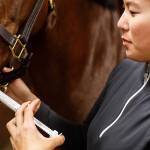Deworming Associated with Colic in Horses

Past studies identified an association between certain intestinal parasites and colic in horses. Considering the routine use of deworming products, whether or not these parasites continue to play a role in colic remains unclear.
To help clarify the incidence of colic attributable to intestinal parasites, German researchers selected 620 horses, all of which were patients at a veterinary clinic, and determined tapeworm, small strongyle, and large strongyle burdens in each.* Of the 620 horses, half were chosen because they presented to the clinic with colic.
“Despite identifying relatively high infection rates of these parasites in all horses included in the study, the researchers were surprised to find no association between parasite burden and colic,” explained Kathleen Crandell, Ph.D., a nutritionist for Kentucky Equine Research.
The researchers noticed one noteworthy trend: horses that had been chemically dewormed in the week prior to hospitalization had a 2.4 times higher risk of developing colic than horses that had been dewormed at least 8 weeks before admission.
Despite the increased risk of colic associated with deworming, the researchers wrote, “The high large strongyle and considerable tapeworm seroprevalences encountered in this investigation should prompt veterinarians, farm managers, and horse owners to maintain effective parasite control measures.”
Owners should use recommended deworming practices and be certain to maintain consistency with their feed management when deworming. “Any medication can potentially disturb the large intestinal microbiome. Thus, minimizing any disruption of the microbiome is important for decreasing the risk of colic, especially when administering chemical dewormers,” said Crandell.
To support the intestinal microbiome in the face of deworming, Crandell recommends the following:
- Avoid changing feed management practices directly before or after deworming;
- If changes are necessary, then proceed as gradually as possible; and
- When adding new supplements, make sure to start with a small amount and work up to the recommended daily amount to minimize intestinal disruption.
“Harmful changes to the microbial population of the cecum and colon can be modulated through the use of a hindgut buffer to maintain proper pH. This preventive would be particularly important when the gut is challenged by medications like antibiotics and dewormers,” advised Crandell.
*Gehlen, H., N. Wulke, A. Ertelt, M.K. Nielsen, S. Morelli, D. Traversa, R. Merle, D. Wilson, and G. von Samson-Himmelstjerna. 2020. Comparative analysis of intestinal helminth infections in colic and non-colic control equine patients. Animals (Basel) 10(10):1916.








